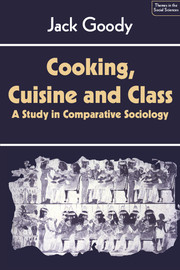Book contents
- Frontmatter
- Contents
- List of illustrations
- Preface
- Dedication
- 1 Intentions and remarks
- 2 State of play
- 3 Production and consumption among the LoDagaa and Gonja of northern Ghana
- 4 The high and the low: culinary culture in Asia and Europe
- 5 Industrial food: towards the development of a world cuisine
- 6 The impact of the world system
- 7 Cooking and the domestic economy
- Appendix: Terms, operations and cognition
- Notes to the text
- Bibliography
- Index
- BY THE SAME AUTHOR
6 - The impact of the world system
Published online by Cambridge University Press: 05 June 2012
- Frontmatter
- Contents
- List of illustrations
- Preface
- Dedication
- 1 Intentions and remarks
- 2 State of play
- 3 Production and consumption among the LoDagaa and Gonja of northern Ghana
- 4 The high and the low: culinary culture in Asia and Europe
- 5 Industrial food: towards the development of a world cuisine
- 6 The impact of the world system
- 7 Cooking and the domestic economy
- Appendix: Terms, operations and cognition
- Notes to the text
- Bibliography
- Index
- BY THE SAME AUTHOR
Summary
In precisely what way has the Third World been affected? To answer this question let us return to the region which we know in some detail. It is not one that has been directly involved in the production of cash crops or minerals for overseas, although it has supplied much of the labour and received little of the wealth arising out of these activities. Because of the marginal position of much of the savannah country in recent developments in West Africa, the patterns of life described in an earlier chapter still exist among the bulk of the inhabitants of northern Ghana today.
At the same time the growth of the nation state has led to the emergence of an elite involved in administrative, professional, political and military activities, an elite that constitutes a ‘new class’. Although this class is spoken of as the bourgeoisie or middle class it is in fact the ruling class, and it seems curious to refer to an emergent middle class when locally at least there is no one else on top. The immediate basis of their recruitment is education. The first echelon of schoolchildren were sometimes the offspring of chiefs, traditional and government appointed, who were enjoined to send representatives to the newly establised schools. In other cases the school children had less noble genealogies, having been pressed into service in the place of chiefs' sons.
- Type
- Chapter
- Information
- Cooking, Cuisine and ClassA Study in Comparative Sociology, pp. 175 - 190Publisher: Cambridge University PressPrint publication year: 1982



